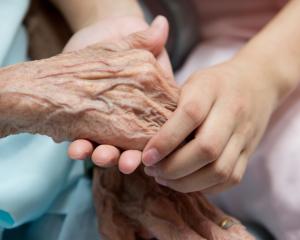
Political upheavals like Donald Trump and Brexit are exacerbating the pressure on New Zealand’s mental health system, SDHB mental health medical director Brad Strong says.
"The world just feels like a more unsafe place."
For some people, the febrile atmosphere exacts a toll.
Obsessing about international political situations and engaging in "bitter" online debates is largely a bad idea, he says. It does not mean people should not engage politically but staying local is a good thing. It might mean focusing on a local climate change challenge such as that facing South Dunedin, rather than railing against coal-fired factories in China.
"Bless the guys at the ODT for keeping us locally grounded."
His take is somewhat unconventional but the California-raised psychiatrist is no denier of the system’s direct failings. He says suicide prevention is not the national or local priority it should be and he supports calls for a national review of mental health.
"Everybody is feeling the pressure", but he says the worst strain on the mental health service is in the higher-population North Island boards. Dunedin’s mental health service has settled after a difficult few years. Most notably, it was rocked by claims ketamine was being inappropriately prescribed for depression. In 2013, the Health and Disability Commissioner said the practice was "borderline", and told the SDHB to tighten up on off-label drug prescriptions.
Dr Strong said Dunedin now has an off-label ketamine clinic to ensure every patient is properly informed and there are standard procedures to follow. It is separate from a trial under way in Dunedin which is part of an Australian study into ketamine’s efficacy for depression.
His take on ketamine is that it is a mixed bag.
"It looks like folks can do extraordinarily well [on ketamine] ... and some folks it just flat doesn’t work."
The service had not actually done anything wrong in prescribing ketamine in the first place. No breach of patient rights was found, he said.
However, he acknowledges doctors’ training can make it difficult to admit fault.
"We’re trained to be perfect lone-wolf providers of care. It’s inhuman really, it doesn’t make any sense, what we’re trained to believe.
"Sometimes we’ve taken too long to engage with families around stuff.
"There are times when we screw up; hopefully not very often.’’He says it is hard to prevent suicide if it is not a top priority. Elimination should be the goal but it is not.
"It’s not any place at the top of anybody’s list of important things in New Zealand or in the Southern DHB, or in the South Island Alliance, or in the Ministry of Health."
Provisional figures for 2015-16 show 579 people died from suicide, 43 of whom were in the the southern district.Dr Strong agrees with calls for a national review and admires the "People’s Review of the Mental Health System" recently initiated by campaigners.
"What they are talking about is stuff that we all struggle with.‘‘It’s time, it seems to me, to listen and participate in it."
In a statement, Health Minister Jonathan Coleman said there was no need for a high-level review.
"A national inquiry in itself isn’t going to improve access to services."
Funding for mental health and addiction increased from $1.1 billion in 2008-09 to $1.4 billion this year.
Dr Coleman defended the existing approach to suicide prevention.
"There are clear expectations and performance measures for DHBs on mental health services and these are outlined in DHBs’ annual plan expectations.
"Last year DHBs put in place suicide-prevention plans to enable them to work with other agencies and local communities to reduce the risk," Dr Coleman said.
For help
Lifeline: 0800 543 354
Depression Helpline (8am-midnight): 0800 111 757
Healthline: 0800 611 116
Samaritans: 0800 726 666
Suicide Crisis Helpline: 0508 828 865 (0508 TAUTOKO)
Youthline: 0800 376 633, free text 234 or email talk@youthline.co.nz
What’s Up (for 5-18-year-olds; 1pm-11pm): 0800 942 8787
Kidsline (for children up to 14; 4pm-6pm weekdays): 0800 54 37 54 (0800 KIDSLINE)
Comments
Does this mean that international events and climate change are triggering episodes of unwellness? I don't mean to be facetious, and there is nothing desirable about mental illness, but if those are the stressors, depression sufferers are a better class of concerned persons than in the past.
If National does a poll, they may find they are electorally vulnerable on public health funding.












